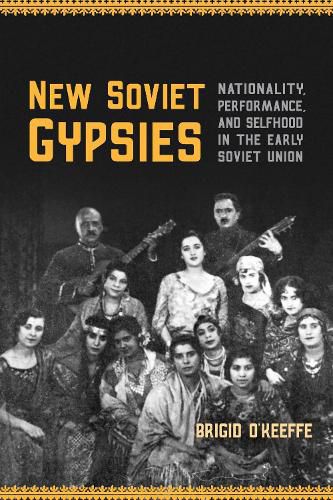Readings Newsletter
Become a Readings Member to make your shopping experience even easier.
Sign in or sign up for free!
You’re not far away from qualifying for FREE standard shipping within Australia
You’ve qualified for FREE standard shipping within Australia
The cart is loading…






As perceived icons of indifferent marginality, disorder, indolence, and parasitism, Gypsies threatened the Bolsheviks’ ideal of New Soviet Men and Women. The early Soviet state feared that its Romani population suffered from an extraordinary and potentially insurmountable cultural backwardness, and sought to sovietize Roma through a range of nation-building projects. Yet as Brigid O'Keeffe shows in this book, Roma actively engaged with Bolshevik nationality policies, thereby assimilating Soviet culture, social customs, and economic relations. Roma proved the primary agents in the refashioning of so-called backwards Gypsies into conscious Soviet citizens.
New Soviet Gypsies provides a unique history of Roma, an overwhelmingly understudied and misunderstood diasporic people, by focusing on their social and political lives in the early Soviet Union. O'Keeffe illustrates how Roma mobilized and performed Gypsiness as a means of advancing themselves socially, culturally, and economically as Soviet citizens. Exploring the intersection between nationality, performance, and self-fashioning, O'Keeffe shows that Roma not only defy easy typecasting, but also deserve study as agents of history.
$9.00 standard shipping within Australia
FREE standard shipping within Australia for orders over $100.00
Express & International shipping calculated at checkout
As perceived icons of indifferent marginality, disorder, indolence, and parasitism, Gypsies threatened the Bolsheviks’ ideal of New Soviet Men and Women. The early Soviet state feared that its Romani population suffered from an extraordinary and potentially insurmountable cultural backwardness, and sought to sovietize Roma through a range of nation-building projects. Yet as Brigid O'Keeffe shows in this book, Roma actively engaged with Bolshevik nationality policies, thereby assimilating Soviet culture, social customs, and economic relations. Roma proved the primary agents in the refashioning of so-called backwards Gypsies into conscious Soviet citizens.
New Soviet Gypsies provides a unique history of Roma, an overwhelmingly understudied and misunderstood diasporic people, by focusing on their social and political lives in the early Soviet Union. O'Keeffe illustrates how Roma mobilized and performed Gypsiness as a means of advancing themselves socially, culturally, and economically as Soviet citizens. Exploring the intersection between nationality, performance, and self-fashioning, O'Keeffe shows that Roma not only defy easy typecasting, but also deserve study as agents of history.